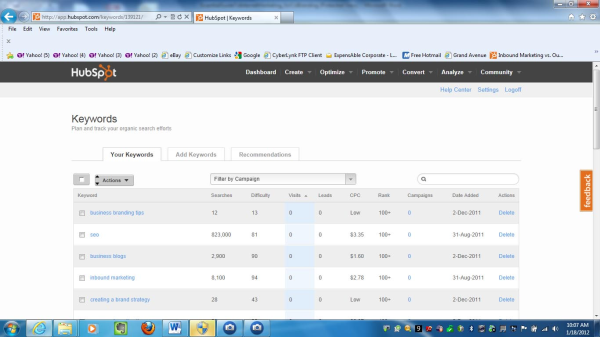In Internet Marketing you being with Key Word Strategy. "When you sing you begin with Do Ray Me", If this sounds like a really bad rhyme with a "Sound of Music" song, you're right.
The first and most important thing you have to do in internet marketing is Keyword Strategy. Let me tell you why. More and more people these days are shopping online through search engines using keywords. Keywords are the words you type on a search engine, such as google, to start your search. And how well your site is optimized for the particular keywords someone types in when looking for your products or service determines if your site will pop to the top (front page) of the search.
It’s difficult to know exactly which keywords will get the most relevant people to find your business, but there are ways to determine the popularity and competitiveness of certain keywords. You can also test and analyze how effective different keywords are in drawing visitors to your site, using, for example Hubspot's Keyword Grader Tool and Performance Metrics.
Keyword research is an ongoing process that should be followed closely. It gives valuable insight in terms of industry trends and product demand. Comprehensive keyword research can help a business grow its organic traffic and save you from spending money on pay-per-click (PPC) campaigns such as Google AdWords.
How to Create a Keyword Strategy
1. Create a list of 6-7 keywords relevant to your business.
Think like you’re using the brain of someone searching for your product with a search engine. For small- and medium-sized businesses, your keywords are not your brand name. Instead, think of words and short phrases that get to the core of what your product or service is about.
2. Choose keywords based on difficulty and relevance.
The keywords you choose should be based on difficulty and relevance.
Some very general words such as “marketing” or “business” are very competitive, making it harder to rank well for them in search engine results. If you are a small- or medium-sized business, you probably want to choose less competitive keywords, more specifically related to your business (these are commonly referred to as long tail keywords).
The greater the volume of searches on a keyword, the more competitive it is. There are a number of different tools you can use to determine the competitiveness of a specific keyword as well as suggest and help you brainstorm new keyword ideas. These tools include the Google Keyword Tool or HubSpot’s Suggest Keywords feature in its software’s Keyword Grader tool.
Another important factor for picking keywords is their relevance to your business. While some obscure terms might be easy to rank for, they might not be relevant to your business.
You should find a balance between relevance and difficulty. Choose about 6 keywords that match your business well.
Note that these keywords do not have to be perfect at first. You can try out different ones to see which work best for you.
3. Design and optimize your website around your keywords.
Now that you’ve chosen your keywords, you should incorporate them into your website.
When your website starts bringing in new customer's due to your keyword strategy, everyone will be singing your praises.

Source:
Hubspot and Bay Area Inbound Co-Branded Guide: "Essential Guide to Internet Marketing".
Click to get your Free Copy now for more info: "Essential Guide to Internet Marketing".
Bay Area Inbound is a full-service Internet Marketing Consulting Company and proud reseller of Hubspot Software.
Please explore our site www.bayareainbound.com for more information on how we can help your company Get Noticed, Get Talked About, Get Found, Get Leads, and Get Sales.
